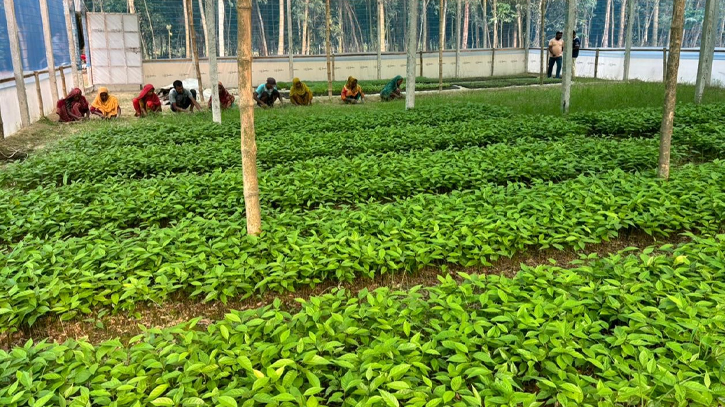
Photo : Courtesy
Standard Chartered Bangladesh and Thengamara Mohila Sabuj Sangha (TMSS) are partnering to empower 11,000 farmers from Bogura, Joypurhat, Sirajganj, Natore, Pabna, and Rajshahi to adopt the eco-friendly agricultural practice of polyhouse farming – a modern farming method that enables year-round cultivation, despite external conditions.
By providing beneficiaries with polyhouse development resources and the necessary training, the bank is optimizing crop yield and quality while simultaneously catalyzing income generation opportunities for thousands.
As part of this initiative, Standard Chartered is supplying watermelon seeds and other vegetable seeds to beneficiaries to improve homestead gardening efforts.
The bank will also help to set up vermicompost production centres, so that farmers can reduce their dependency on chemical fertilizer.
In total, the bank will contribute over Tk2.7 crore to implement this project.
Lack of access to high-quality seed inputs, water scarcity, and overuse of fertilizer and pesticides heavily impact Bangladesh’s agricultural sector.
To build a more sustainable and productive system, Standard Chartered and TMSS will establish polyhouse farming structures, which will empower farmers to grow high-value vegetables like broccoli, capsicum, cabbage, and lettuce, as well as other fruit and flowers together.
The polyhouse structures are designed with sustainability in mind – the polythene and other plastic components are made to last for at least five years, after which they will be recycled. The bank is enabling access to this expensive resource.
Naser Ezaz Bijoy, CEO of Standard Chartered Bangladesh, said: “For every $1 spent on adaptation in Bangladesh, an economic benefit of $10 can be generated – indicating a dire need to invest in adaptation projects. Polyhouse farming brings these two focus areas into alignment, under one roof. Creating sustainable structures made of recyclable polythene and plastics, where a variety of crops can grow within a controlled and steady environment, allows our nation’s farmers to transcend the limitations imposed by external factors while saving water and reducing their reliance on fertilizer and pesticides. This transformative approach not only ensures consistent yields but also fosters resilience against the escalating threats of climate change, water scarcity, crop vulnerability, and pest infections.”
Prof Hosne Ara Begum, founder, TMSS, said: “The main purpose is to boost high-value crop farming in the drought-prone area through modern polyhouse farming methods. Not only will the farmers benefit financially, but this will also be a boost to our economy. So, I presume this project will help lot of farmers to produce many varieties of crops during the off-season, which will improve their economic condition.”
Messenger/Sajib








